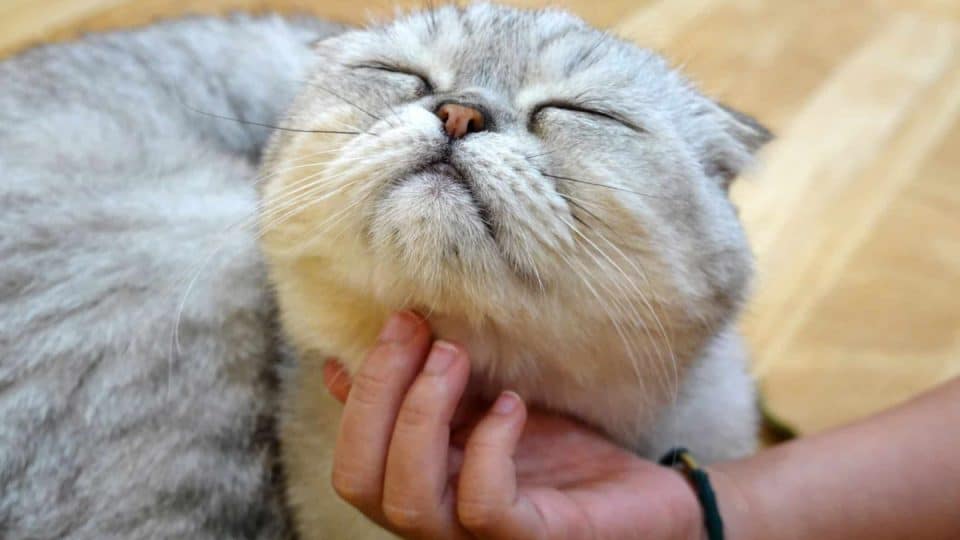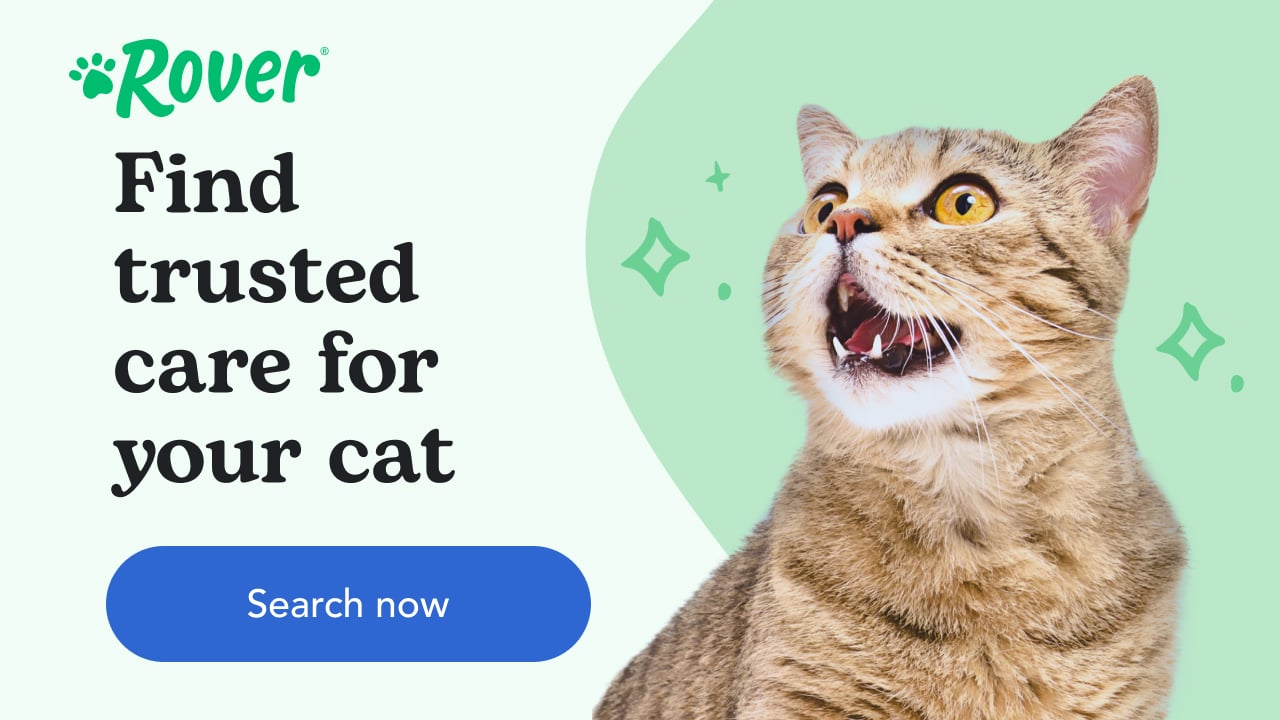Most cats love scratches under the chin. So, if your cat is shying away, it’s sure to raise an eyebrow. Check under their chin and on their muzzle for little black flecks or larger lesions that look like human acne; if you see them, your cat might have feline acne. Yes, cats can get acne, and it’s most common under their chin and around their lips.
We asked vets (including two veterinary dermatologists) for the scoop on everything they know about this common cat skin condition that affects cats of all ages and breeds. While the root causes of feline acne isn’t clear, treatment is typically straightforward.
What Does Feline Acne Look Like?
Cat acne looks like human acne, says Dr Michelle Piccione, DVM, DACVD, a board-certified veterinary dermatologist at VERG Brooklyn. Cat acne starts as blackheads commonly found under the chin.
It’s easy to overlook feline acne. After all, mild cases can look like dirt in the fur and may not have other symptoms. But it’s important to catch a cat’s acne before it becomes severe or deeply infected. Signs and symptoms of cat acne include:
- A chin that looks dirty. Black dirt-like dots might be a sign that a cat has blackheads. To rule out other causes of black specks in the fur (like flea dirt), schedule a visit to your vet.
- Itching of the chin or face. Remember, other skin conditions like fleas and food allergies could cause itchiness, too.
- Hair loss. Under the chin or around the lips.
- Redness and swelling. These are signs of inflammation (AKA an infection).
- Lesions. They’ll typically be red and may or may not have pus, like human pimples.
- Scabs. Cats itching irritated acne could cause scabbing under the chin and on the face.
“Severe cases of feline acne can be very painful,” Dr Piccione says. And while cat acne isn’t life-threatening, secondary infections can wreak havoc. So, it’s best to get ahead of the breakout before it becomes severe.
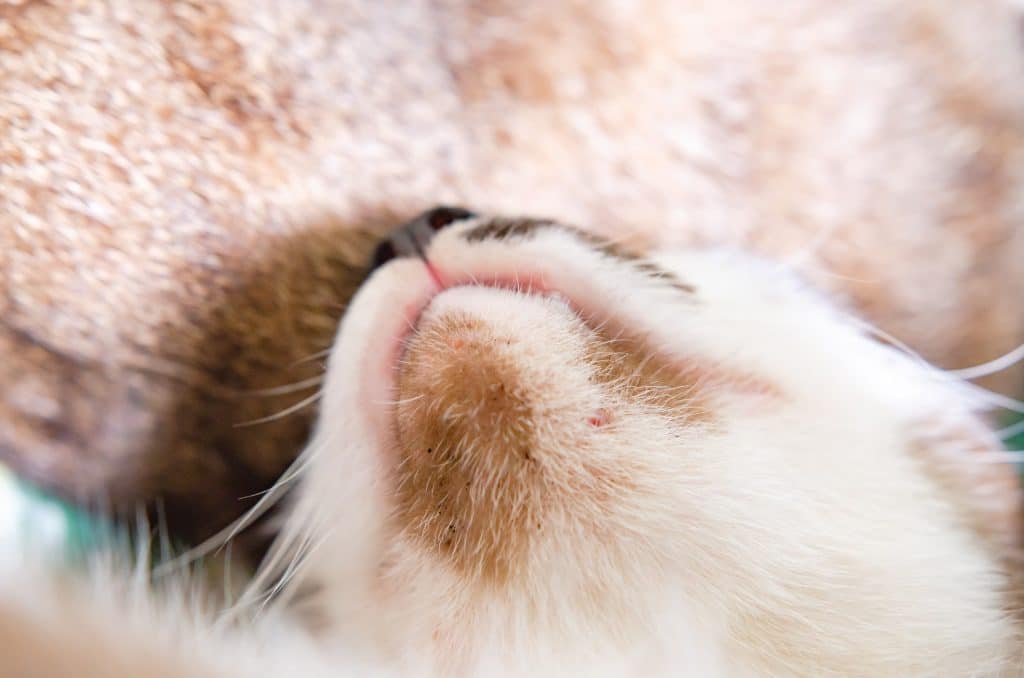
iStock/tonphai
How To Treat Cat Acne
While cat acne and human acne are similar, never use human acne medicine on cats without your veterinarian’s approval. Here’s the breakdown of the best medical and home treatments for cat acne.
Medical treatments for cat acne
Dr Piccione shares that treatment often initially involves topical products. Usually, this is a highly effective antibiotic ointment rubbed directly onto the affected skin. In other cases, your vet might prescribe a special shampoo to flush gunk from the hair follicle; they might opt to shave the chin for better hygiene and application of the medicine.
When cat acne is severe, secondary infections might be at play. They’ll require oral antibiotics, steroids, or retinoids. And to help alleviate pain and discomfort, anti-inflammatory medication might be prescribed, too.
Home remedies for cat acne
There are several home remedies and over-the-counter treatments for mild cat acne but talk to your vet before applying anything to your cat’s skin. At the first sign of redness, swelling, or lesions, “visit a veterinarian for a tailored diagnostic and treatment plan,” says Dr Ramón Almela, DVM, PhD, DECVD.
If you spot black specks on your cat’s chin and your veterinarian ruled out parasites, Dr Almela says Epsom salts are a natural remedy that flushes out the hair follicles. Additionally, you can look for products containing benzoyl peroxide or salicylic acid, then ask your veterinarian if they’re safe for use on animals, Dr Piccione suggests.
Studies indicate that supplements in the form of omega-3 fatty acids can reduce inflammation and heal the skin, providing relief for mild cases of cat acne. Gentle, warm compresses can be useful, too. But popping cat acne is never a good idea; steer clear of irritating the infection-prone blackheads or lesions.
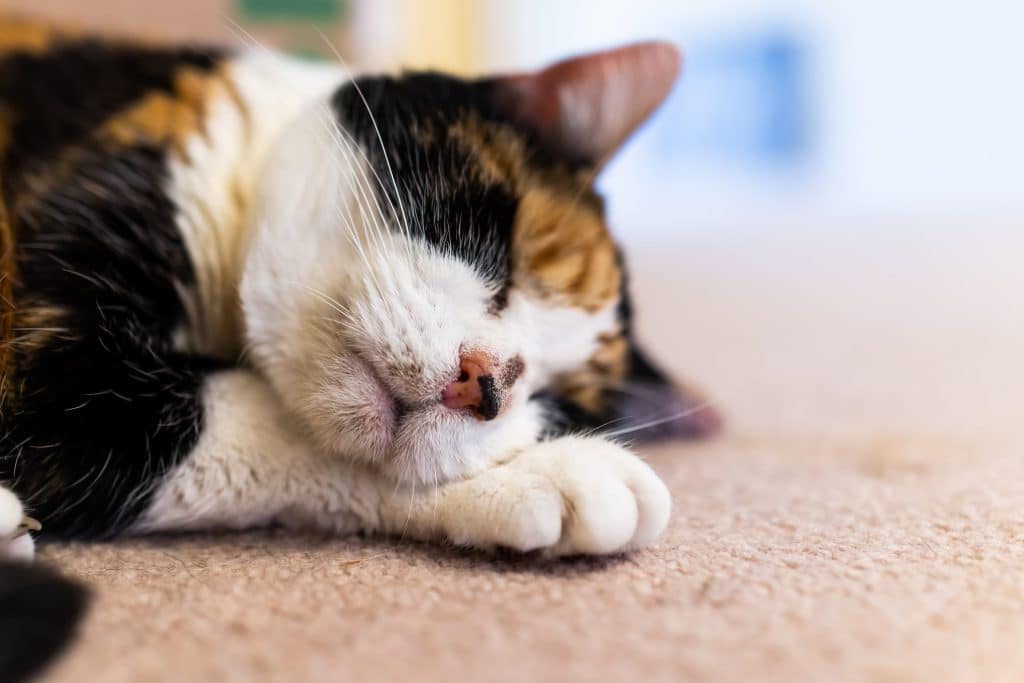
iStock/krblokhin
Cat acne isn’t known to go away on its own. So, if at-home treatment isn’t working, or if symptoms are worsening, visit your vet. Specialists like Dr Piccione can help with severe skin conditions. However, most cases of feline acne can be resolved by your general vet.
What Causes Cat Acne?
Aside from a few educated guesses, the cause of feline acne remains unknown, Dr Almela shares.
According to Dr Piccione, cat acne is a common idiopathic disorder of follicular keratinization. Basically, too much keratin (a protein found in the skin) is being produced and getting trapped in follicles, which produces blackheads. But why is too much keratin being produced? We don’t know (AKA the idiopathic tag). When blackheads get secondary bacterial infections, that’s when raised pimples and pus form.
The causes of cat acne may include:
- Excessive oil production. Dr Piccione theorises that cat acne is most commonly found under the chin because that’s where a greater number of sebaceous (oil-producing) glands are located. Normally, the glands produce just enough oil to keep the fur and skin healthy. Too much, and it clogs up the follicles.
- Stress. Stress can negatively affect a cat’s quality of life, but it can also take a toll on the immune system and skin health.
- Viral infections. Researchers observed outbreaks of feline acne in shelters and multicat households, indicating there may be a contagious viral component at play.
- Allergies. Chronic skin irritation, food allergies, and contact allergies may be associated with feline acne.
- Poor grooming. A change in grooming habits can be caused by old age, feeling unwell, or stress. Without proper grooming, those healthy oils can build up and form blackheads—just like in humans.
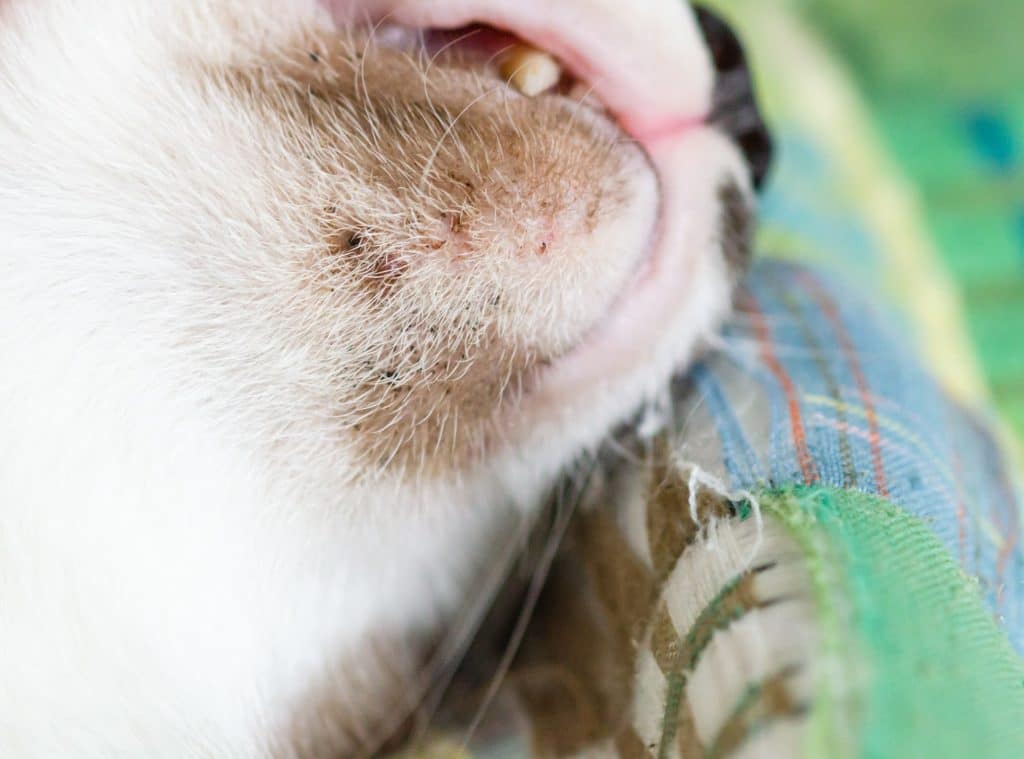
iStock/tonphai
Dr Piccione cautions that there’s no clear evidence that these underlying conditions directly cause feline acne. And despite popular belief, she says there’s no clear evidence that using plastic bowls increases the likelihood of cat acne, either.
However, improved hygiene and steel or ceramic bowls can reduce the likelihood of spreading secondary infections to areas of chin acne. So, don’t skip washing food bowls after every meal and throw away scratched or damaged plastic bowls that are more likely to harbour harmful bacteria.
Chronic feline acne
If your cat has recurring feline acne or a bad breakout that won’t go away, talk to your vet about possible underlying causes. “Lifelong symptomatic treatment is likely needed to prevent and control the development of lesions,” Dr Piccione says.
When left untreated, severe cases of feline acne cause deep bacterial infections, scarring of the tissue, and cysts. Typically, severe cat acne will look just as bad as the cat feels.
According to Cornell University, there’s no clear indication that cats of any age, breed, or gender are more prone to cat acne or recurring cat acne—and Dr Piccione and Dr Almela agree. There are currently no cat breeds known to be prone to acne breakouts.
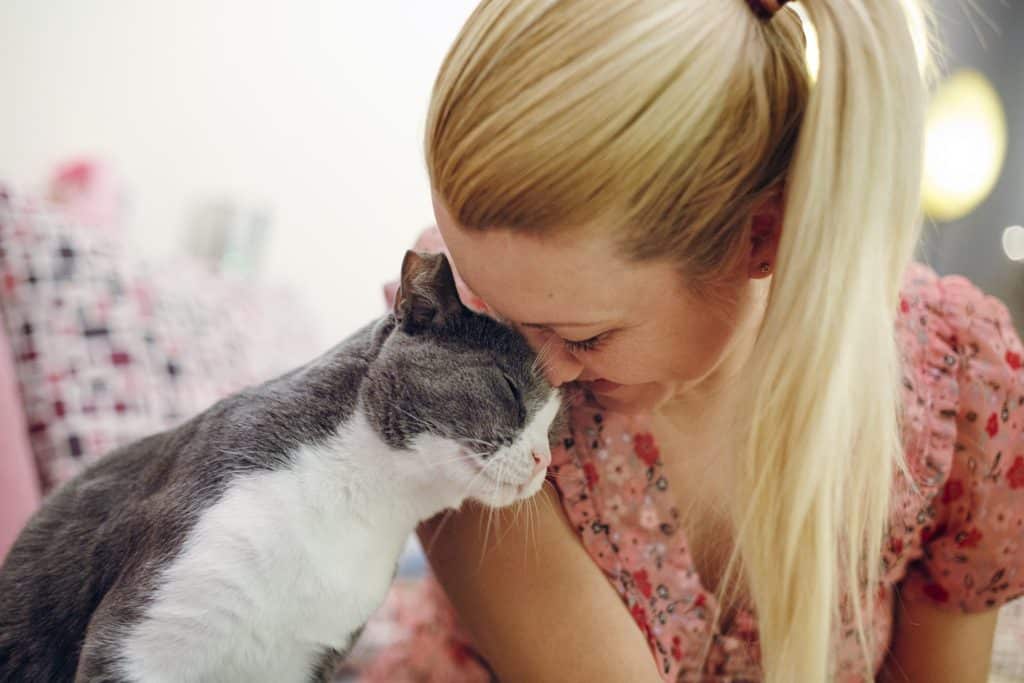
iStock/IvanJekic
How To Prevent Cat Acne
According to Dr Almela, there’s no proven method for stopping a cat from getting chin or face acne in the first place. Until experts uncover the underlying cause of our cats’ breakouts, Dr Almela and Dr Piccione say to follow your veterinarian’s recommendations for cat care, including serving complete and balanced meals, routinely grooming your cat, reducing stress, and scheduling routine veterinary checkups. At the first sign of anything unusual in or on your cat’s skin, ask your vet to check it out.
